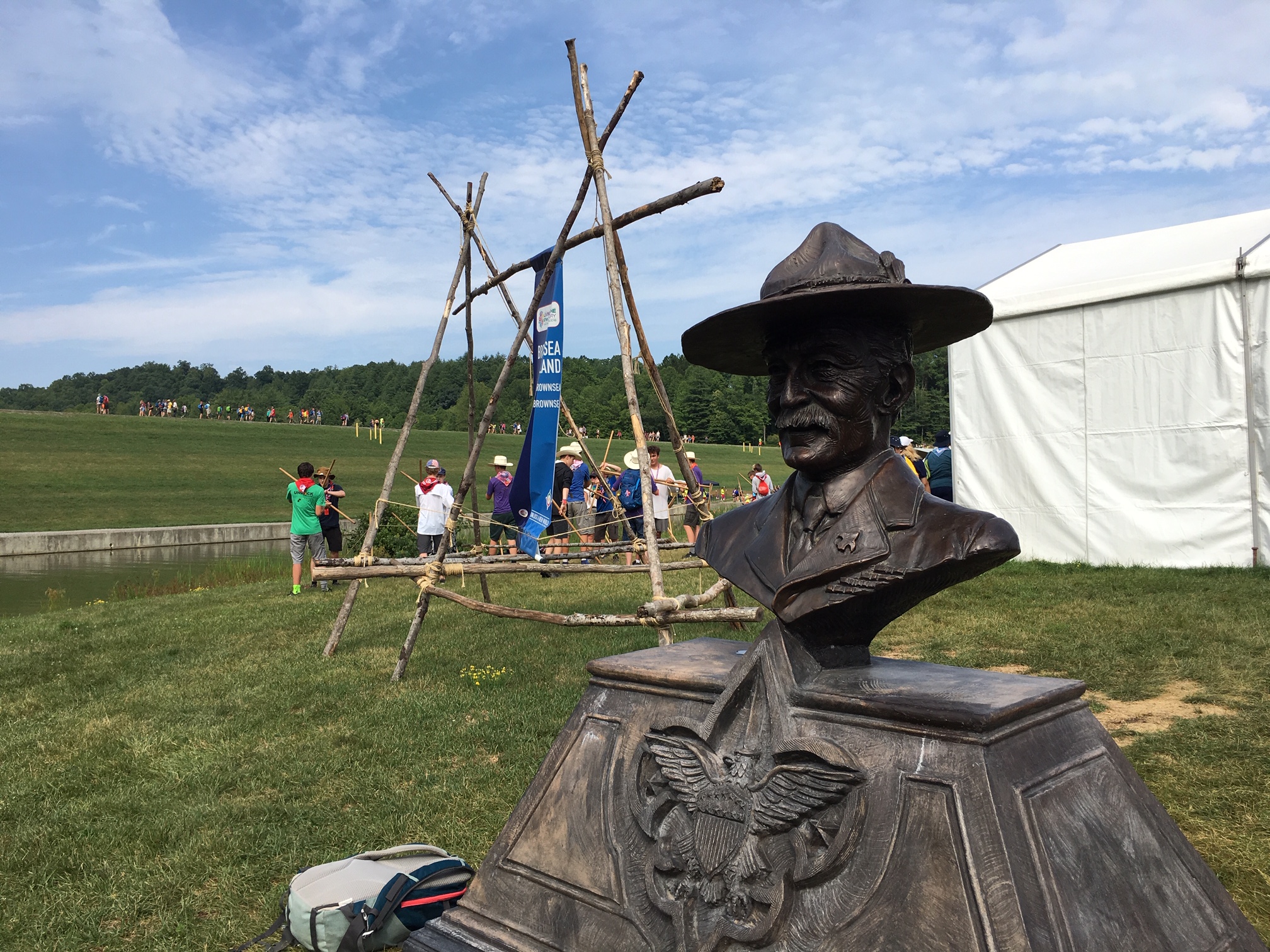GLEN JEAN, W.Va. — More than a century ago, Lord Robert Baden-Powell founded the Scouting movement in England, organizing the first camping experience on Brownsea Island in 1907.
The following year, the British army officer released the first “Scouting for Boys” handbook. Since the camp and the book’s first edition, the Scouting movement has gone worldwide, leading to millions of children, teenagers and adults joining various organizations.
Baden-Powell died in 1941, but his spirit is alive in one section of the Summit Bechtel Family National Scout Reserve: a miniature version of Brownsea Island.
“I’m over 162 years old,” a man portraying Baden-Powell told a group of scouts on Wednesday. “I will live on as long as there is Scouting. You mark my words. You’ll see it in a generation, two generations from now. I’ll still be talking to you.”
The modern Baden-Powell and the smaller Brownsea Island are part of the World Scout Jamboree experience; more than 45,000 scouts and visitors can travel back to 1907 and take part in the first Scouting activities, including flag history courses, tug of war and an early version of basketball.
“It was an experiment based on our ideas on how units should be formed,” the jamboree Baden-Powell said of Brownsea Island. “We thought that the natural configuration of boys is the small gang of six to 10 boys. Sure enough, what we did at Brownsea Island worked. Boys of different classes were brought together, and had a jolly good time with each other.”
The 2019 Baden-Powell rarely breaks character; when asked about his life outside of the jamboree, he provided MetroNews with a business card listing his “U.S. contact” as Walker Chandler, an attorney who lives outside of Atlanta.
Rosemary Ghosh helps run the jamboree’s version of Brownsea Island; she said her interest in history led to her involvement in this year’s World Scout Jamboree.
“I think it’s something a lot of younger members are not necessarily aware of, so it’s good for them to come down here and do activities from the first camp Baden-Powell ran,” she said. “These activities are kind of old school. There’s no technology, so it’s refreshing.”
Ghosh, who is from the United Kingdom, said while the activities might not easily fit in the 21st century, she believes the trip back in time can help visitors connect Scouting’s past and present.
“We hope they gain a little bit more knowledge on how Scouting began and take it back to their troops,” she said.
“It’s history. It’s part of who we are. It’s how we learn about ourselves and how we progress.”
The jamboree also has an area recognizing previous international events; a museum is set up among the tents of scout organizations showcasing artifacts dating back to the first World Scout Jamboree in 1920, which took place in London. The exhibit includes such items as posters, uniforms, patches from numerous countries and belongings of Scouting’s first leaders.
“We tend to think Scouting from when we joined to where we are now. There’s a huge history before us that made all of this possible,” said Jack McKinney, a member of the National Scouting Museum Committee. “Who were the people and events that built Scouting into the world organization that it is?”
According to McKinney, many of the objects on display are on loan from organizations and private collectors. He noted organizers faced more challenges preparing this exhibit compared to similar museums for National Scout Jamborees.
“We had to reach out to people in other countries. We have several internationals in our group here who are with us on the floor today,” he said. “Some of their items are in the exhibit today.”
McKinney said the exhibit helps visitors understand Scouting’s roots and its international appeal.
“I think they should get a feel for how many people over the years have contributed to the growth of the Scouting movement,” he added.
Back on Brownsea Island, the jamboree’s Baden-Powell — whose mustached face resembles that of the founder — told visitors while activities and technology have changed, Scouting’s shared principles remain just the same as they were in the early 1900s.
“Children are not cowards, and they don’t wish to be cowards. They wish to test themselves in the world,” the modern Baden-Powell said in his American accent.
He pointed to a climbing tower located on the mainland as a test of one’s bravery.
“They need to learn to face danger. A scout is brave. He has the courage to face danger in spite of fear, and to stand up against for what’s right against the coaxing of friends and the jeers and threats of enemies,” he added. “That takes bravery, and it’s what every person and every scout needs to understand.”




